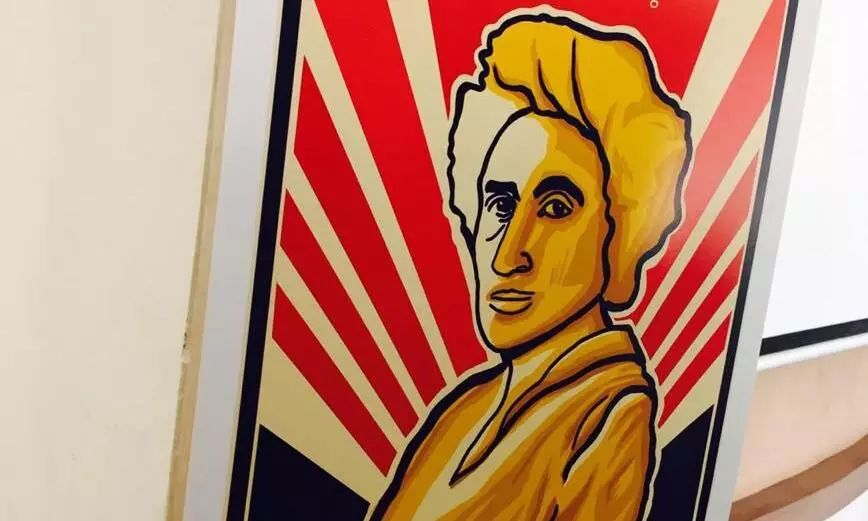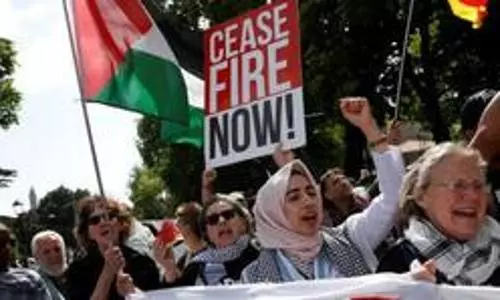

Image Courtesy : Facebook @rosaluxsouthasia
Remembering Rosa Luxemberg- The marxist revolutionary
text_fieldsThe 48-year-old Rosa Luxemburg was one among the most outstanding Marxist revolutionaries of her epoch. Born in Poland in 1871, she became active in revolutionary politics as a youth. She became a leader of the Social Democratic Party of Germany (SPD) and of the Marxist movement internationally after being forced to leave tsarist-controlled Poland because of her political beliefs.
As a prominent opponent of right-wing opportunism in the Social Democratic Party in Germany( SPD), Luxemburg concluded that the party had become a "stinking corpse" after the August 4, 1914 vote for war credits by the SPD parliamentary group.Rosa worked with Karl Liebknecht to found the Spartakusbund and then the Communist Party of Germany, (KPD) as an alternative leadership for the working class.
Imprisoned for their opposition to the First World War, both leaders were freed from jail as a result of a revolutionary uprising of German workers in November 1918.The Social Democratic right wing joined the government in order to save German capitalism and crush the revolutionary movement of the working class.
The granting of war credits to the German government by the SPD parliamentary faction in August 1914 is a gigantic blow for Luxemburg and the entire socialist workers' movement. At a stroke it annuls the educational work patiently carried out by the party during the previous 40 years. The barbaric experience of World War I (1914) leads to the outbreak of the Russian Revolution in 1917 and political turmoil in Germany in 1918.
Both Luxemburg and Liebknecht were assassinated on the orders of SPD leaders on January 15, 1919. She was struck down with the butt of a rifle in the Hotel Eden foyer and brought to a car where she was shot. Her body was thrown into the Landwehr canal, where it was recovered only months later.
Had Luxemburg and Liebknecht survived in 1919, not only German history, but also world history would have turned out differently.
A victorious socialist revolution in Germany would have freed the Soviet Union from its isolation and thereby removed the most important factor for the growth of the bureaucracy and the rise of Stalin.
It is also inconceivable that the KPD, under the leadership of the uncompromising internationalist Rosa Luxemburg, would have bowed to Stalin's nationalist course, or supported his policy of social fascism, which paved the way for Hitler to come to power in 1933.
The refusal of Stalin, and his German proxy Thälmann, to fight for a united front with the "social fascist" SPD against the Nazis divided and paralysed the working class. Based on a correct policy by the KPD, which had hundreds of thousands of members and millions of voters, the working class could have prevented Hitler from coming to power.
Luxemberg was among the first to take up the struggle against the revisionist theories of Eduard Bernstein inside the German Social Democracy(SPD). Her polemic Reform or Revolution remains a classic of Marxism. Her revolutionary views put her in direct conflict with the right-wing trade union functionaries within the German Social Democracy, who banned her from their congresses.
Luxemburg later entered into struggle against Karl Kautsky's (one of the leaders of SPD) increasing adaptation to the rightward-moving German social democratic leadership, which anticipated Kautsky's later betrayal of Marxism.
In 1905 revolution breaks out in Russia. A wave of spontaneous mass strikes spreads across the country. The German SPD leadership, dominated by its conservative trade union wing, had reacted defensively. Returning to Berlin from Russia in 1906, Rosa Luxemburg salutes the revolution. Leading figures in the SPD argue that the situation in Germany is not ripe for the type of mass actions associated with the 1905 Russian revolution. Even aging party leader of SPD ,August Bebel declares, "You cannot compare the Russian situation with Germany."
Luxemburg recognises that the Russian Revolution(1905) is an expression of a new historical era ending the relatively peaceful period that had lasted for 40 years.
The murder of Karl Liebknecht as well as Rosa Luxemburg was the conscious response of the capitalist class to the mortal danger it faced. After the 1917 October Revolution in Russia, the capitalist class determined that it had to prevent the development of revolutionary leadership in the working class or exterminate that leadership where it came forward.
German film director Margarethe von Trotta in her extraordinary movie" Rosa Luxemburg "(1986) deeply deals with the last 20 years in the life of the outstanding socialist and revolutionary, Rosa Luxemburg. The movie features key political and personal episodes from the life of the revolutionist, demonstrating her enormous courage and political determination.
The film includes scenes which shows Luxemburg's passionate speech at a workers' assembly in Frankfurt am Main in 1913 which ,would be highly topical even today: "The delusion of a gradual trend towards peace has dissipated. Those who point to 40 years of peace in Europe, forget the wars that took place outside of Europe and in which Europe played a role. . (...) The rulers believe they have the right to decide on such a vital question over the heads of the entire people. (...) When we are asked to raise the weapons of murder against our French and other brothers, we declare: No, we refuse!"
Von Trotta's film features Liebknecht's electrifying speech in Berlin's Tiergarten: "The revolution in Germany has come! (…) We call for revolutionary readiness and the utilisation of all our energy in order to undertake the rebuilding of the world. Either we slide back into the swamp of the past or we continue the struggle until the freeing of all humanity from the curse of bondage. Long live the world revolution! Long live Spartacus!"
The film " Rosa Luxemburg" (1986) makes the case that genuine democracy is only made possible by people like Rosa. It must be based on the independent mass movement of the working-class population politically enlightened by an international socialist movement. Accused by a prosecutor of being a public enemy, Luxemburg defends herself in one scene by stating that only the people, not the government, can decide on the question of war or peace: "No war against our will."
Rosa Luxemburg in her speech at the founding congress of the Communist Party (KPD) on December 31, 1918 clearly said:
"The progress of large-scale capitalist development during 70 years has brought us so far that today we can seriously set about destroying capitalism once and for all. No, still more. Today we are not only in a position to perform this task, its performance is not only a duty toward the proletariat, but it offers the only means of saving human society from destruction… For us there is no minimal and no maximal program. Socialism is one and the same thing—this is the minimum we have to realize today" [Rosa Luxemburg, Our Program and the Political Situation (1918)].
Vindicating her words,one hundred years after Luxemburg's death, all of the contradictions of the capitalist system that made the period 1914-45 the most violent in human history are erupting once again. Nationalism, trade war and war dominate international relations. Far-right and fascist forces are on the offensive in many countries, with the explicit or concealed support of the state.
Out of the experience of the horrors of the First World War(1914), Rosa Luxemburg posed the alternative to the working class in her famous aphorism "socialism or barbarism." She was among the few leaders of the socialist movement in Germany who stood fast in their internationalist principles at the outbreak of World War I and opposed support for the imperialist bloodbath.
Rosa Luxemburg, who throughout her life was a consistent follower of Marxism as a scientifically elaborated theory for guiding the activities of the working class and its vanguard in the revolutionary party. Whatever document of Luxemburg one chooses, it clearly shows that she developed all of her proposed courses of action from this basic perspective, constantly subjecting them to critical scrutiny.
As Luxemburg formulated it in 1918, society once again confronts "either continuation of capitalism, new wars, and imminent decline into chaos and anarchy, or abolition of capitalist exploitation." More than ever before, humanity's future depends upon the construction of a socialist and internationalist party in the working class based on the legacy of Marxism.In all her theoretical works, Luxemburg evinced great foresight and a profound understanding of the problems of the development of the international workers movement. A study of her writings is critical to revolutionaries and students of Marxism today.
As today marks 102th year sice the death of one of the most horrific and consequential crimes in world history i.e murder of the finest representatives of International Marxist movement(Rosa Luxemberg and Karl Liebknecht),everyone needs to study carefully the enormous wealth of theoretical works by Rosa Luxemburg and draw the appropriate lessons for the current political and economic crisis.






















